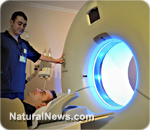 The health risks associated with radiation exposure, whether it comes from cancer treatments or medical imaging scans, are much more significant than most people probably think. The latest published data on radiation exposure suggests that roughly 25,000 Americans develop cancer every year as a result of medical radiation exposure, and many more experience DNA damage that could eventually lead to the development of cancer and other health problems in the long term.
The health risks associated with radiation exposure, whether it comes from cancer treatments or medical imaging scans, are much more significant than most people probably think. The latest published data on radiation exposure suggests that roughly 25,000 Americans develop cancer every year as a result of medical radiation exposure, and many more experience DNA damage that could eventually lead to the development of cancer and other health problems in the long term.
CT scans, which are a relatively modern medical imaging technology, are particularly problematic as they emit far higher doses of radiation than traditional x-rays do. Based on the figures, a single CT scan can blast up to 500 times the amount of radiation released by a single x-ray, an astounding level when considering how gratuitously CT scans are administered within the medical profession today.
Failing to recognize the long-term health consequences of repeated and perpetual exposure among their patients, many doctors needlessly order CT scans for patients who do not need them, or order multiple scans when only one is necessary. Data compiled from outpatient claims filed through Medicare, for instance, reveals that CT scans are routinely overused at hundreds of hospitals across the country, and that patients are needlessly "double scanned" more than 80 percent of the time. (http://www.nytimes.com/2011/06/18/health/18radiation.html)
The high cost of CT scanning equipment has also led to an epidemic of unnecessary CT scans at private practices as well. Because they know that, most of the time, insurance companies and government health programs will reimburse them, many doctors simply default to CT scans whenever there is even a remote possibility that they might be useful -- and oftentimes these doctors double-up on scans as well, even though this is almost never medically necessary.





 The U.S. government has given an ultimatum to the international group that helps provide vaccines to...
The U.S. government has given an ultimatum to the international group that helps provide vaccines to...






























